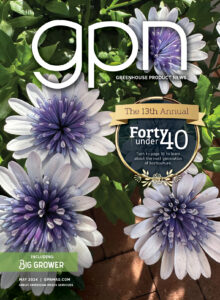Virginia Tech Awarded $2.7 Million Grant
The U.S. Department of Agriculture’s National Institute of Food and Agriculture has awarded Virginia Tech a five-year, $2.7 million grant to study integrated management of zoosporic pathogens and irrigation water quality to create a more sustainable green industry.
The U.S. Department of Agriculture’s National Institute of Food and Agriculture has awarded Virginia Tech a five-year, $2.7 million grant to study integrated management of zoosporic pathogens and irrigation water quality to create a more sustainable green industry.
Chuanxue Hong, professor of plant pathology, physiology and weed science in the College of Agriculture and Life Sciences and the project’s director, explained that the study will help the nursery and floriculture industry become more sustainable, enabling it to better compete in the global market. In particular, the project will search for biologically based control methods for the Phytophthora and Pythium pathogens and develop best management practices to recycle irrigation water safely to protect water quality and improve water use efficiency.
“What we learn will have applications not only to crop health but also to much broader areas, such as water quality,” said Hong, who works at the Hampton Roads Agricultural Research and Extension Center in Virginia Beach, Va. “This project aims to reduce the crop health risks associated with recycling water for irrigation purposes and to answer the question, ‘How can we make the production of nursery and greenhouse crops a more sustainable industry?'”
The Phytophthora genus contains at least 120 species of pathogens harmful to a wide range of ecologically and economically important plants. In Virginia, researchers have identified 35 Phytophthora species from irrigation water. According to Hong, nursery and greenhouse owners faced with a water shortage have to recycle water to irrigate their crops, inadvertently causing these waterborne plant pathogens to affect their plants and, therefore, their bottom line.
“We want growers to recycle water, but we don’t want them to recycle pathogens,” Hong said.
The researchers are studying the biology of the pathogens so they can use this knowledge to develop protocols for best management practices and help growers design or modify irrigation systems that prevent pathogens from reaching horticultural crops.
Other partners in the project include Pennsylvania State University, the University of Maryland, the U.S. Department of Agriculture’s Agricultural Research Service, the University of California-Riverside, Rutgers University and Christopher Newport University.


 Video Library
Video Library 




















